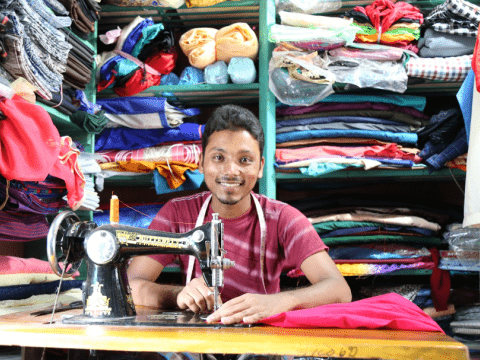Empowering youth towards economic resilience in southwest Bangladesh

Life can be difficult for youth like Feroj and his friends in southwest Bangladesh. Although Bangladesh has experienced a steady decline in absolute poverty rates, it is still struggling to reduce the number of people living in extreme poverty and meet the employment need of 4.4 million youth. In southwest Bangladesh, where Feroj lives, 25-34% of households live below the lower poverty line. Poverty reduction efforts by the government and international organizations have long been underway, but they sometimes fail to reach and effectively address the needs of ultra- poor families, who survive on less than $1.90 a day. These intense hardships take an emotional toll on families.
After failing to pass secondary school exams, Feroj was despondent and depressed. Poverty prevented him from continuing his studies further and he imagined himself to be useless and a burden to his poverty-stricken family. Feroj tried hard to find a suitable job to support his family but due to his incomplete education and lack of skills, he couldn’t succeed.
In addition to helping families in southwest Bangladesh improve their nutrition, livelihoods, and resilience to disaster, World Vision Bangladesh – with funding from the U.S. government – is providing hope for youth, as well. Nobo Jatra, translated as “new beginning,” is a five-year development and food security program implemented by World Vision Bangladesh and funded by USAID. One way the program promotes food security is by intentionally engaging with youth to help them acquire market driven skills for economic empowerment.
Feroj was selected for a two month apprenticeship in a tailoring shop and was provided with $11 a month to help pay for food and travel costs. Upon successful completion of his training, Feroj got a job at the same tailoring shop.

“The training has given me self-confidence. I am working hard to earn so that I can help my family. My family is now proud of me” says Feroj.
Being the eldest son in an eight-member family, Feroj always felt the burden of responsibility to provide. With a monthly salary of $83, Feroj is now supporting his family and is hopeful that he will be able to increase his salary in the near future. In fact, Feroj has a dream to set up his own tailoring shop.

“I look forward to establish my own business where I will engage my brothers too. I look forward to a secure future for my family and myself” says Feroj.
Feroj is among the hundreds of youth who have seized the opportunity to develop skills in a market driven trade. Trainings and skills are provided on-the-job by employers who are committed to providing a learning environment for the youth and are open to recruiting trained youth upon completion of a successful apprenticeship. Till date, 126 youth (f=27; m=99) have completed apprenticeships and are earning an average income $43 per month.